
Joel Daniel Coen and Ethan Jesse Coen, together known as the Coen brothers, are an American filmmaking duo. Their films span many genres and styles, which they frequently subvert or parody. Their most acclaimed works include Blood Simple (1984), Raising Arizona (1987), Miller's Crossing (1990), Barton Fink (1991), Fargo (1996), The Big Lebowski (1998), O Brother, Where Art Thou? (2000), No Country for Old Men (2007), A Serious Man (2009), True Grit (2010) and Inside Llewyn Davis (2013). Many of their films are distinctly American, often examining the culture of the American South and American West in both modern and historical contexts.

True Grit is a 1969 American Western film directed by Henry Hathaway, starring John Wayne as U.S. Marshal Rooster Cogburn, Glen Campbell as La Boeuf and Kim Darby as Mattie Ross. It is the first film adaptation of Charles Portis' 1968 novel of the same name. The screenplay was written by Marguerite Roberts. Wayne won an Oscar for his performance in the film and reprised his character for the 1975 sequel Rooster Cogburn.

Alexander Franklin James was a Confederate soldier and guerrilla; in the post-Civil War period, he was an outlaw. The older brother of outlaw Jesse James, Frank was also part of the James–Younger Gang.

Quantrill's Raiders were the best-known of the pro-Confederate partisan guerrillas who fought in the American Civil War. Their leader was William Quantrill and they included Jesse James and his brother Frank.
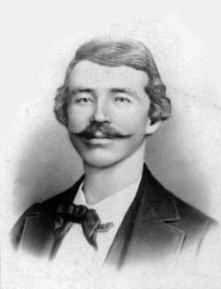
William Clarke Quantrill was a Confederate guerrilla leader during the American Civil War.

The Lawrence Massacre was an attack during the American Civil War (1861–65) by Quantrill's Raiders, a Confederate guerrilla group led by William Quantrill, on the Unionist town of Lawrence, Kansas, killing around 150 unarmed men and boys.
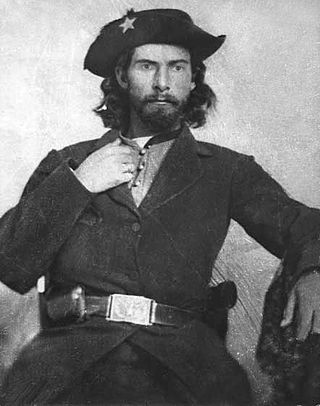
William T. Anderson, known by the nickname "Bloody Bill" Anderson, was a soldier who was one of the deadliest and most notorious Confederate guerrilla leaders in the American Civil War. Anderson led a band of volunteer partisan raiders who targeted Union loyalists and federal soldiers in the states of Missouri and Kansas.
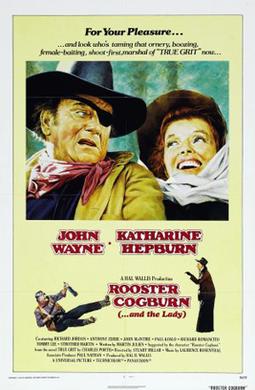
Rooster Cogburn, also known as Rooster Cogburn , is a 1975 American Western film directed by Stuart Millar, and starring John Wayne and Katharine Hepburn. Written by Martha Hyer (who is credited as Martin Julien. Based on the titular character from Charles Portis' 1968 Western novel True Grit, the film is a sequel to True Grit, and the second installment overall in the film series of the same name. The plot details the continuing adventures of Reuben J. "Rooster" Cogburn, an aging one-eyed lawman, whose badge is suspended due to his record of routine arrests that end in bloodshed. He is offered a chance to redeem himself by bringing in a group of bank robbers who have hijacked a wagon shipment of nitroglycerin, and finds himself aided in his quest by a spinster whose father was killed by the criminals.

The Battle of Lone Jack took place during the American Civil War on August 15–16, 1862 in Jackson County, Missouri. The battle was part of the Confederate guerrilla and recruiting campaign in Missouri in 1862.

Bass Reeves was a runaway slave, gunfighter, farmer, scout, tracker, railroad Agent and deputy U.S. Marshal. He spoke and understood the Five Civilized Tribal languages including Cherokee, Choctaw, Chickasaw, Seminole and Creek. Bass was one of the first African-American Deputy U.S. Marshals west of the Mississippi River, mostly working in the deadly Indian Territory. The region was saturated with horse thieves, cattle rustlers, gunslingers, bandits, bootleggers, swindlers, and murderers. Reeves made more than 3,000 to 4,000 arrests in his lifetime, only killing twenty men in the line of duty.

Bushwhacking was a form of guerrilla warfare common during the American Revolutionary War, War of 1812, American Civil War and other conflicts in which there were large areas of contested land and few governmental resources to control these tracts. This was particularly prevalent in rural areas during the Civil War where there were sharp divisions between those favoring the Union and Confederacy in the conflict. The perpetrators of the attacks were called bushwhackers. The term "bushwhacking" is still in use today to describe ambushes done with the aim of attrition.

Charles McColl Portis was an American author best known for his novels Norwood (1966) and the classic Western True Grit (1968). Both Norwood and True Grit were adapted as films, released in 1970 and 1969, respectively. True Grit also inspired a film sequel and a made-for-TV movie sequel. The second film adaptation of True Grit was released in 2010.

John M. Pickard was an American actor who appeared primarily in television westerns.

William Francisco Cobbs is an American actor. He is known for such film roles as Louisiana Slim in The Hitter (1979), Walter in The Brother from Another Planet (1984), Reginald in Night at the Museum (2006) and Master Tinker on Oz the Great and Powerful (2013). He played Lewis Coleman on I'll Fly Away (1991–1993), Jack on The Michael Richards Show (2000), and had guest appearances on Walker, Texas Ranger and The Sopranos. In 2020, he won a Daytime Emmy Award for Outstanding Limited Performance in a Daytime Program for the series Dino Dana.

True Grit is a 1968 novel by Charles Portis that was first published as a 1968 serial within The Saturday Evening Post. The novel is told from the perspective of a woman named Mattie Ross, who recounts the time when she was 14 and sought retribution for the murder of her father by a scoundrel, Tom Chaney. It is considered by some critics to be "one of the great American novels." True Grit is included in the Library of America of Portis' Collected Works.
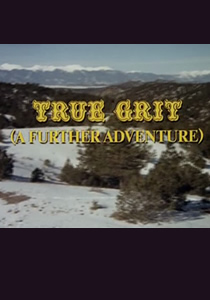
True Grit: A Further Adventure is a 1978 American Western television film directed by Richard T. Heffron. It is the sequel Rooster Cogburn (1975), and the third installment in the True Grit film series. While John Wayne portrays Rooster Cogburn in the first two films, Warren Oates takes over the role in this 1978 TV version. Lisa Pelikan portrays Mattie Ross, played in the first film by Kim Darby. The supporting cast features Lee Meriwether and Parley Baer.

True Grit is the soundtrack album by Glen Campbell and Elmer Bernstein for the film True Grit starring John Wayne. Campbell performs on only two of the album's tracks, the first and last while the remaining eight tracks are taken from music composed by Bernstein for the film.

James Jackson McAlester was an American Confederate Army soldier and merchant. McAlester was the founder of McAlester, Oklahoma, as well as a primary developer of the coal mining industry in eastern Oklahoma. He served as the United States Marshal for Indian Territory (1893–1897), one of three members of the first Oklahoma Corporation Commission (1907–1911) and the second lieutenant governor of Oklahoma from 1911 to 1915.
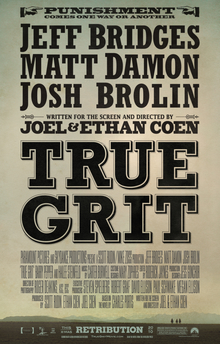
True Grit is a 2010 American Western film directed, written, produced, and edited by Joel Coen and Ethan Coen. It is an adaptation of Charles Portis' 1968 novel of the same name, starring Jeff Bridges as Deputy U.S. Marshal Reuben J. "Rooster" Cogburn and Hailee Steinfeld as Mattie Ross. The film also stars Matt Damon, Josh Brolin, and Barry Pepper. It is the fourth installment overall in the film series of the same name, and a reimagining of the 1969 previous film adaptation which starred John Wayne, Kim Darby, and Glen Campbell.

The True Grit film series consists of American western dramas, including theatrical and made-for-television installments. The plot follows the adventures of Reuben J. "Rooster" Cogburn in the Old American West, and detail his role in bringing justice to outlaws and bandits who wrongfully terrorize small towns and villages. Each movie includes his voyages with women he is tasked with protecting, despite his apprehensions.



















